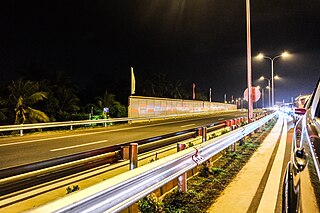
Transport in Sri Lanka is based on its road network, which is centred on the country's commercial capital Colombo. A rail network handles a portion of Sri Lanka's transport needs. There are navigable waterways, harbours and three international airports: in Katunayake, 35 kilometres (22 mi) north of Colombo, in Hambantota, and in Jaffna.

Ircon International Limited, formerly Indian Railway Construction Limited (IRCON), is an engineering and construction organisation, specialized in transport infrastructure. The PSU was established in 1976, by the Government of India under the Indian Companies Act 1956. IRCON was registered as the Indian Railway Construction International Ltd., a wholly (100%) owned entity of the Ministry of Railways. Its primary charter was the construction of railway projects in India and abroad. Ircon has since diversified into other transport and infrastructure segments and with its expanded scope of operations around the world, the name was changed to Indian Railway International Ltd. in October 1995.
Louis Berger is a full-service engineering, architecture, planning, environmental, program and construction management and economic development firm based in Morristown, New Jersey. Founded in 1953 in Harrisburg, Pennsylvania by Dr. Louis Berger, the firm employs nearly 6,000 employees in more than 50 countries worldwide. The company was acquired by WSP Global in 2018.
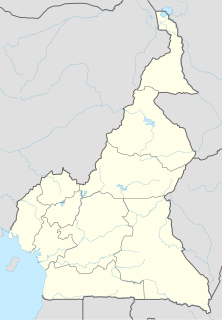
Lolabé is a small coastal town in Cameroon. It lies on the Atlantic Ocean, about halfway between Kribi and the border with Equatorial Guinea.
China Communications Construction Company, Ltd. (CCCC) is a majority state-owned, publicly traded, multinational engineering and construction company primarily engaged in the design, construction and operation of infrastructure assets, including highways, bridges, tunnels, railways, subways, airports, oil platforms, and marine ports. CCCC has been a contractor for numerous Belt and Road Initiative projects.
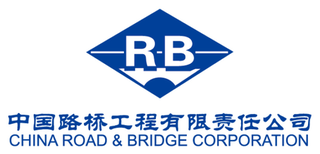
China Road and Bridge Corporation (CRBC), a subsidiary of Fortune Global 500 company China Communications Construction Company (CCCC), focuses on global civil engineering and construction projects such as highways, railways, bridges, ports, and tunnels. Growing out of the Foreign Aid Office of the Ministry of Communications of China, CRBC and its predecessors have been executing projects since 1958. In 1979, CRBC was formally established and entered the international contracting market. The parent entity, CCCC, was formed through the combination of CRBC and China Harbour Engineering Co Ltd (CHEC) in 2005.
CIMIC Group Limited is an Australian multinational contractor. It is active in the telecommunications, engineering and infrastructure, building and property, mining and resources, and environmental services industries. It has operations in Australia, Southeast Asia, New Zealand, and the Middle East. Leighton Holdings was rebranded as the CIMIC Group in 2015.

Penta-Ocean Construction Co., Ltd. is a major Japanese construction firm. It specializes in marine works and land reclamation.

Sinohydro is a Chinese state-owned hydropower engineering and construction company. In the 2012 Engineering News-Record Top 225 Global Contractors, a ranking by annual revenue, the company is 14th by overall position, and 6th among Chinese construction companies.

The Port of Colombo is the largest and busiest port in Sri Lanka. Located in Colombo, on the southwestern shores on the Kelani River, it serves as an important terminal in Asia due to its strategic location in the Indian Ocean. During the 1980s, the port underwent rapid modernization with the installation of Cranes, Gantries and other modern-day terminal requirements.
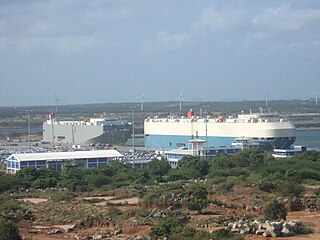
The Hambantota Port is a maritime port in Hambantota, Sri Lanka. The first phase of the port was opened on 18 November 2010, with the first ceremonial berthing of the naval ship "Jetliner" to use the port facilities. It is named after former President Mahinda Rajapaksa. Hambantota Port is built inland and operated by the Sri Lanka Ports Authority. Total estimated construction cost of the Phase 1 of the project is US$361 million, out of which 85% was funded by the EXIM Bank of the People's Republic of China.

The Mumbai Trans Harbour Link (MTHL), also known as the Sewri-Nhava Sheva Trans Harbour Link, is an under-construction 21.8 kilometres (13.5 mi), freeway grade road bridge connecting the Indian city of Mumbai with Navi Mumbai, its satellite city. When completed, it would be the longest sea bridge in India. The bridge will begin in Sewri, South Mumbai and cross Thane Creek north of Elephanta Island and will terminate at Chirle village, near Nhava Sheva. The road will be linked to the Mumbai Pune Expressway in the east and to the proposed Western Freeway in the west. The sea link will contain a 6 lane highway, which will be 27 meters in width, in addition to two emergency exit lanes, edge strip and crash barrier.
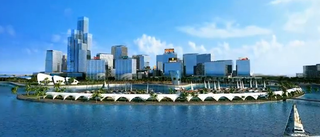
Colombo International Financial City (CIFC) is a special financial zone and International Financial Centre located in Colombo, Sri Lanka, which is currently under construction on reclaimed land adjacent to the Galle Face Green. The land reclamation work had been completed as of January 2018. The cost is slated at 15 billion dollars.

The China–Sri Lanka relations refers to bilateral relations between the People's Republic of China and Democratic Socialist Republic of Sri Lanka. There is a Chinese embassy located in Colombo and a Sri Lankan embassy situated in Beijing. Historical and cultural ties between the two countries extend back hundreds of years.

Mattala Rajapaksa International Airport (MRIA) is an international airport serving southeast Sri Lanka. It is located in the town of Mattala, 18 km (11 mi) from Hambantota. It is the first greenfield airport and the second international airport in the country, after Bandaranaike International Airport in Colombo.

The Doha Metro is a rapid transit system in Doha, Qatar's capital city, which became operational on 8 May 2019. It has three lines with an approximate overall length of 76 km and 37 stations. It is an integral component of the larger Qatar Rail network, which will include a long-distance rail for passengers and freight, linking Qatar to the GCC, and the Lusail LRT. Capable of reaching 100 km/h, the Doha Metro will be one of the fastest driverless trains in the world.
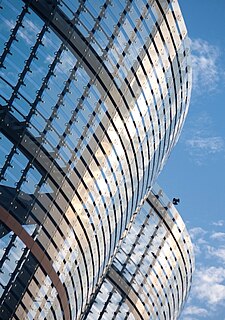
Yanjian Group is a Chinese construction and engineering company. It is one of the 250 largest international contractors in 2013 as reported by Engineering News-Record magazine.
Payra Port Authority is an autonomous port authority in charge of the third port in Bangladesh, Port of Payra, and is located in Patuakhali, Bangladesh. The chairman of the Payra port authority is Commodore Jahangir Alam.

The Sinamalé Bridge links the islands of Malé, Hulhulé and Hulhumalé in the Maldives. The 2.1 km long bridge has two car lanes and separate lanes for motorcycles, and pedestrians, and opened on 30 August 2018. It was originally called the China-Maldives Friendship Bridge due to funding received from the Chinese government. It is the first inter-island bridge in the Maldives.

Denagama Vitharanage Chanaka Dinushan is a Sri Lankan politician and a current member of the Parliament of Sri Lanka. He was elected as the United People's Freedom Alliance candidate, representing the Hambantota Electoral District at the general parliamentary elections held in August 2015.
















